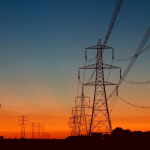 Members of Professor Bielicki’s Energy Sustainability Research Group work on solving important problems related to Energy Sustainability, where engineering, natural and physical science, economics, social organization, and policy intersect. Energy sustainability is broader than that typical conceptions of “sustainable energy”, which usually refers to producing and using energy in ways that have less negative environmental impacts than conventional approaches (e.g., coal-fired power plants). Reducing the environmental externalities such as these are clearly important… but sustainability also entails reducing the amount of resources that are required to provide usable energy (such as coal, water, and land), reducing the costs and increasing the affordability of that energy, maintaining and increasing the reliability of the energy that societies uses, and increasing the accessibility of energy so that more and more people can without have that reliable, affordable, and increasingly environmentally benign energy regardless of where they live or their socio-economic conditions.
Members of Professor Bielicki’s Energy Sustainability Research Group work on solving important problems related to Energy Sustainability, where engineering, natural and physical science, economics, social organization, and policy intersect. Energy sustainability is broader than that typical conceptions of “sustainable energy”, which usually refers to producing and using energy in ways that have less negative environmental impacts than conventional approaches (e.g., coal-fired power plants). Reducing the environmental externalities such as these are clearly important… but sustainability also entails reducing the amount of resources that are required to provide usable energy (such as coal, water, and land), reducing the costs and increasing the affordability of that energy, maintaining and increasing the reliability of the energy that societies uses, and increasing the accessibility of energy so that more and more people can without have that reliable, affordable, and increasingly environmentally benign energy regardless of where they live or their socio-economic conditions.
Many of the challenges associated with understanding and advancing energy sustainability do not lie in a particular academic discipline. We investigate important questions at the intersections of those traditional disciplines to glean insights that may not reveal themselves if the disciplines involved were viewed in isolation. We are currently working on issues in the following topics:
Coupled Interactions and Environmental Consequences of Food, Energy, and Water Systems:
Using CO2 for Geothermal Energy Production and Storage:
Risks of Emerging Subsurface Energy Technologies:
Bioenergy Pathways:
Energy System Transitions:
Energy and Water in a Climate and Carbon-Constrained World:
Socioeconomic Risks and Realities in Unconventional Oil and Gas Development: